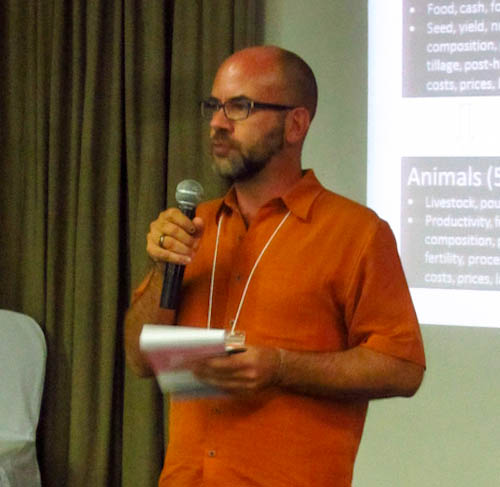RISING voices: Robert Richardson, agricultural economist, Malawi and Zambia

Robert Richardson was born in Louisiana, USA. He studied agricultural and resource economics and is now an Associate Professor of Sustainable Development at Michigan State University. He teaches interdisciplinary courses at both the undergraduate and postgraduate levels, and conducts research on food security and the environment. He was also conducting research on agricultural-environmental linkages in Zambia and on sustainable tourism development in coastal Kenya.
He joined Africa RISING in September 2012. He has two positions – one, as Principal investigator for an integrated project in Zambia ‘Impact of sustainable intensification on landscapes and livelihoods’. It aims to understand the linkages between sustainable intensification and biodiversity conservation, particularly forest and wildlife conservation.
The project is using participatory system dynamics modeling to develop an integrated framework that aims to advance understanding of the landscape level implications of farm-level sustainable intensification activities and also inform the design of integrated projects in the future. It is supported with funds from USAID’s Bureau for Africa, Bureau for Food Security, and the Bureau for Economic Growth, Education, and Environment.
Second, He is co-principal investigator for a research project in Malawi, ‘Agro-ecological intensification in Malawi through action research with smallholder farmers’. It aims to enhance farmer knowledge and support sustainable intensification pathways for productivity gains in maize-legume diversified systems. He is working with colleagues to study the determinants of farmer participation in field-based learning platforms, and to examine the biophysical and socio-economic constraints to adoption of sustainable intensification technologies.
What motivates you most in your work?
In the context of these projects, I am motivated by the opportunity to use participatory action research to involve farmers in the examination of the potential for sustainable intensification technologies to increase agricultural productivity while conserving natural resources. In general, I am motivated by the opportunity to work on issues related to one of the greatest challenges facing our global society—that is, how to increase agricultural productivity to feed a growing population while reducing negative impacts on the environment.
What is unique about Africa RISING?
Africa RISING is unique in several ways. First, the teams of researchers are interdisciplinary by design, which allows us to generate integrated knowledge that would be less likely to emerge from research within individual academic disciplines. Second, the program involves research projects in several countries throughout sub-Saharan Africa, which allows us to share effective practices and lessons learned. Finally, the program has challenged us all to push the boundaries of conventional thinking about agricultural intensification, to think about the effects of decision-making at multiple scales, such as household, village, regional, and national, and to integrate gender issues in our work at every scale.
What goals do you most want to accomplish at Africa RISING?
Above all, I want to develop a framework and model that will be useful to USAID and other partners in the design of integrated programs involving agricultural development and environmental conservation. Through this process, I hope to gain a better understand the drivers of environmental degradation such as deforestation and biodiversity losses in sub-Saharan Africa, so that interventions can be developed and targeted at shaping choices and behaviors with the greatest potential for enhancing environmental conservation.
What are some challenges faced by Africa RISING?
Interdisciplinary research is hard work. Most scientists were trained in the theories and methods of narrow disciplines, yet difficult problems such as those addressed in the Africa RISING program require integrated thinking. This is not easy, given that we do not all share the same understanding of the problems, and we do not use the same terminology, research methods, or assumptions. The challenge is often exacerbated by the geographic dispersion of the teams, which are located all across Africa, Europe, the United States, and elsewhere.
How do you see your contributions to addressing these challenges?
I contribute to the challenge of interdisciplinary research by always trying to play a facilitative and integrative role, bringing together concepts and assumptions from various disciplines and seeking areas of shared understanding and common ground. Although I have studied decision-making by smallholder farmers in developing countries for more than a decade, I have come to realize that there is still so much I have to learn. My own training has effectively equipped me with the frameworks through which economists address problems, but through working in Africa.




